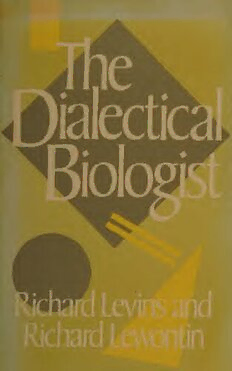
The Dialectical Biologist PDF
Preview The Dialectical Biologist
The Dialectical Biologist ■v _THE _ DIALECTICAL BIOLOGIST Richard Levins and Richard Lewontin Harvard University Press Cambridge, Massachusetts, and London, England Copyright © 1985 by the President and Fellows of Harvard College All rights reserved Printed in the United States of America 109 8 7 6 5 4 3 2 This book is printed on acid-free paper, and its binding materials have been chosen for strength and durability. LIBRARY OF CONGRESS CATALOGING IN PUBLICATION DATA Levins, Richard. The dialectical biologist. Bibliography: p. Includes index. 1. Biology—Philosophy—Addresses, essays, lectures. 2. Biology—Social aspects—Addresses, essays, lectures. I. Lewontin, Richard C., 1929- II. Title. QH331.L529 1985 574’.01 84-22451 ISBN 0-674-20281-3 (cloth) ISBN 0-674-20283-X (paper) s Q_ j- l. " I / •• 1 i '■ ! To Frederick Engels, who got it wrong a lot of the time but who got it right where it counted Preface I HIS BOOK has come into existence for both theoretical and practical reasons. Despite the extraordinary successes of mechanistic reduction¬ ist molecular biology, there has been a growing discontent in the last twenty years with simple Cartesian reductionism as the universal way to truth. In psychology and anthropology, and especially in ecology, evolution, neurobiology, and developmental biology, where the Carte¬ sian program has failed to give satisfaction, we hear more and more calls for an alternative epistemological stance. Holistic, structuralist, hierarchical, and systems theories are all offered as alternative modes of explaining the world, as ways out of the cul-de-sacs into which re¬ ductionism has led us. Yet all the while there has been another active and productive intellectual tradition, the dialectical, which is just now becoming widely acknowledged. Ignored and suppressed for political reasons, in no small part be¬ cause of the tyrannical application of a mechanical and sterile Stalinist diamat, the term dialectical has had only negative connotations for most serious intellectuals, even those of the left. Noam Chomsky once remarked to one of us, who accused him in a conversation of being in¬ sufficiently dialectical, that he despised the term and that in its best sense dialectics was only another way of saying “thinking correctly.” Now dialectics has once again become acceptable, even trendy, among intellectuals, as ancient political battles have receded into distant mem¬ ory. In psychology, anthropology, and sociology, dialectical schools have emerged that trace their origins to Hegel. In biology a school of dialectical analysis has announced itself as flowing from Marx rather than directly from Hegel. Its manifesto, issued at the Bressanone Con¬ ference in 1981 by the Dialectics of Biology Group, began, “A strange fate has overcome traditional Western philosophy of mind.” The Bres¬ sanone Conference did show the power of dialectical analysis as a cri- viii PREFACE tique of the current state of biological theory, although it left for the fu¬ ture the constructive application of a dialectical viewpoint to particular problems and, indeed, an explicit statement of what the dialectical method comprises. As biologists who have been working self-consciously in a dialectical mode for many years, we felt a need to illustrate the strength of the dia¬ lectical view in biology in the hope that others would find a compelling case for their own intellectual reorientation. The essays in this book are the result of a long-standing intellectual and political comradeship. It began at the University of Rochester, where we worked together on theoretical population genetics and took opposite views on the desir¬ ability of mixing mental and physical labor (a matter on which we now agree). Later, working together at the University of Chicago and now at Harvard, in Science for Viet Nam and Science for the People, we have had more or less serious disagreements on intellectual and politi¬ cal tactics and strategy. But all the while, both singly and in collabora¬ tion, we have worked in a dialectical mode. Each of us separately has published a book that is dialectical in its explication, in the formulation of its problematic, and in the analysis of solutions (Richard Levins, Evolution in Changing Environments [Princeton University Press, 1968]; Richard Lewontin, The Genetic Basis of Evolutionary Change [Columbia University Press, 1974]). We believe that the considerable impact of these books, the one in ecology and the other in evolutionary biology, is a confirmation of the power of dialectical analysis. Both separately and together we have published scores of essays, applying the dialectical method, sometimes explicitly, sometimes implicitly, to scientific and political issues and to the relation of one to the other. In¬ deed, it is a sign of the Marxist dialectic with which we align ourselves that scientific and political questions are inextricably interconnected— dialectically related. This book, then, is a collection of essays written at various times for various purposes and should be treated by the reader accordingly. Ex¬ cept for their grouping under general categories, the chapters do not have an ordered relation to one another. Material from some essays is recapitulated in others. The book does not follow a single logical devel¬ opment from first page to last but rather is meant to be a sampler of a mode of thought. That is why we have called it The Dialectical Biolo¬ gist rather than Dialectical Biology, which would announce a single co¬ herent project that we do not intend.
